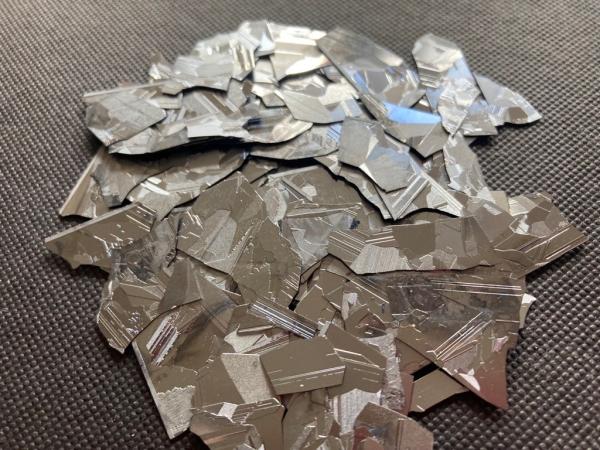Three Europe-based industrial experts develop recycling of photovoltaic panels that would otherwise end up in landfills
Solar energy plays a major role in the clean energy transition. At the heart of photovoltaic technology lies highly purified silicon, which turns sunlight into electricity. Purifying silicon is an energy-intensive process, producing 50 kilograms of CO2 for every kilogram of photovoltaic-grade silicon. Releasing greenhouse gases into the atmosphere is exactly what solar energy is meant to avoid, however.
A France-based start-up named ROSI—which stands for “Return of Silicon”—has developed an innovative, economically viable process for recovering and reusing this high-purity silicon, along with other high-value materials.
Recovering and reconditioning silicon
ROSI is the brainchild of three Europe-based technological and industrial experts with deep experience of the silicon and photovoltaic sectors. One of them, Yun Luo, a physicist originally from Shanghai, says, “We all lived this rollercoaster in the European photovoltaic industry, as there was a very sharp downturn. We figured that a key point for this industry to be sustainable is to reduce the loss.”
She explains that there are, in fact, two waste streams along the photovoltaic value chain. The first one occurs in production, when ingots of highly purified silicon are sliced to make solar cells, and around 40% of the material is lost, flushed away as microparticles.
In 2019, this loss added up to about 200 000 tonnes of highly purified silicon, worth about $1.5 billion and representing a significant quantity of carbon emissions. ROSI has developed a technology to recover and recondition this silicon so that it re-enters the manufacturing process upstream.
The second waste stream is at the end of the life of photovoltaic modules. Their lifespan is generally between 20 to25 years, meaning that a glut of used panels will swamp the market in the coming years. Currently, because it’s difficult and expensive to separate the different materials in panels, recycling efforts target only the aluminium frame, the junction box, and sometimes the front glass.
“All the rest is shredded and landfilled,” says Yun.
She and her partners found a way to isolate the various elements and recover high-value materials, such as silicon, copper, and silver, using non-aggressive thermal and chemical treatments. “By recycling these two loss streams,” Yun says, “we close the photovoltaic value chain.”

ROSI can treat all types of silicon-based panels and reuse the materials
One of ROSI’s young engineers, Hsin-Hsin Fan, explains that their universal process can treat all types of silicon-based panels, of any shape or structure. “That’s what differentiates our process from others. We can delaminate it until every part is separated, and recover five materials [silicon, silver, aluminium, copper, and high-quality glass].”
Yun says that when end-of-life solar panels start to flood in, they have to be ready with the best technology on the market. “I have a deep belief in technology and industrialisation. The energy transition, our CO2 footprint, everything should be based on technology.”
Establishing themselves as a raw material provider
Since ROSI’s founding in 2017, the company has raised around €12 million in funding, which it is using to build recycling plants.
Their first site, in France, will start operating in early 2023, followed by others in Germany and Spain. ROSI plans to expand to other European countries, China, Japan, the United States — anywhere large volumes of solar panels have been installed.
By 2050, the company calculates that its plants can recover 300 000 tonnes of ultra-pure silicon, representing 77 million tonnes of CO2.
Beyond extracting high-value materials from end-of-life panels, ROSI has developed a patented process for reintegrating them into a number of industries, from solar to semiconductors. The company’s main revenue will come from reselling them. “We’re very ambitious,” says Yun. “We don’t position ourselves as a recycling company, we position ourselves as a raw material provider.”
Soren, an organisation responsible for the collection and recycling of photovoltaic modules in France, recently selected ROSI to revalorise silicon and silver from end-of-life panels. Soren’s general manager, Nicolas Defrenne, says that ROSI’s technology “makes good economic sense and good environmental sense. But it’s also necessary because solar panels will continue to be made. And if we don’t establish a circular economy at the same time as the energy transition, neither will work.”
Tracking waste volumes is a major challenge
While things have gone relatively smoothly for the French start-up, it faced its share of challenges, such as recouping used photovoltaic panels.
To secure the supply chain, ROSI has been tracking the waste volume expected to appear on the market, and the real volume that each country has collected.
Until now, the reported collection volume has been much lower than what was anticipated. “A large amount of waste was expected to appear, we are not sure where it is ending up, in landfill or elsewhere,” says Hsin-Hsin. “The critical point is proper collection.”
At the European Investment Bank Institute's 2022 Social Innovation Tournament, which supports entrepreneurs who are making a social, ethical, or environmental impact, ROSI received first prize in the special category blue and green economy.
